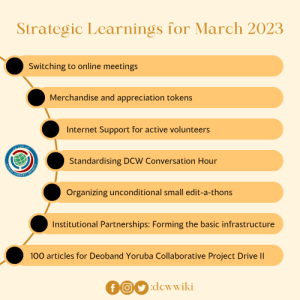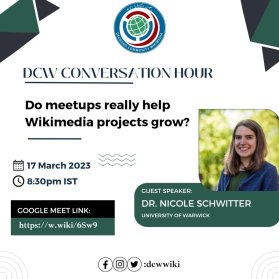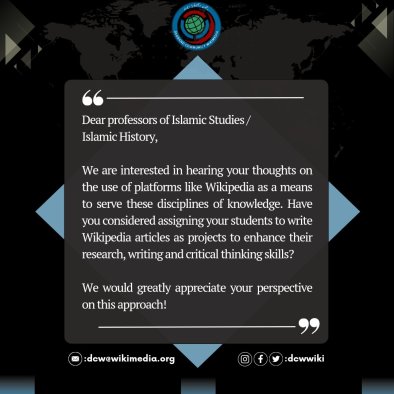The Deoband Community Wikimedia (DCW) researchers working on its strategic research project have submitted their March 2023 learnings. The research work was led by Tahura Aafi, who analyzed some past initiatives of the affiliate, asked for trials of some others, whilst suggesting standardization of initiatives such as the DCW Conversation Hour at the same time.
The course of the study revolved around seven issues: the standardization of the DCW Conversation Hour, internet support for active volunteers, merchandise and appreciation tokens, unconditional small edit-a-thons, substitution of in-person monthly meetups with online meetings, the basic infrastructure required for institutional partnerships, and the Deoband Yoruba Collaborative Project. A regular in-person meetup was organized to help the study, and a fresh conversational hour was organized on 17 March 2023.
DCW Conversation Hour
The affiliate had started a series of conversations in September 2022. The aim of this series was to invite experienced people from within and outside the movement and learn from them. Upon Tahura Aafi‘s suggestion, an invitation was sent to Dr. Nicole Schwitter, a researcher at the University of Warwick, who recently completed her PhD on The Role of Offline Ties of Wikipedians.
The March Conversation Hour appeared successful and it was suggested that standardizing it would help the affiliate grow in several aspects. It was subsequently decided that the event be arranged once in a month and topics of “high-importance” be discussed in these meetings. The study indicated that the affiliate needs to go with demand, for instance, if there comes a need to host the meeting twice in a month, it would be worth a try.
Monthly Regular Meetings
It was suggested that monthly regular meetups between volunteers be substituted with online meetings. The offline meetings could be conducted but these should not happen every month. It was seen that volunteers from even nearby areas were not able to attend offline meetings even though the schedule being shared on time. The researcher thus advised that substitution of these meetings with online meetings would be preferable. Offline meetings such as one-to-one training meetings, meetings with advisors, and other relevant meetings would continue to be organized in-person. The primary learning that the researcher presented was organizing a quarterly or semi-yearly in-person meeting, in which, most active and dedicated volunteers would be given space to speak, and subsequently their works be recognized with merchandise and some other modes of appreciation.
Collaborative Projects
The research extremely focused on the affiliate’s Deoband Yoruba Collaborative Project (DYCP), a knowledge-transformation project that was formed in June 2022. According to Tahura, “the collaborative projects like the Deoband Yoruba Collaborative Project form the backbone of the DCW…, and should be given more space”. The recommendations included doing more investment on such collaborative projects. Tahura suggested that the DCW should form more such collaborations with small-language Wikipedia communities. This would help the thematic knowledge get represented in knowledge-bases where it is completely missing. Subject to the recommendations, the affiliate has decided to set a target of 100 articles for the upcoming drive of the DYCP project, likely happening afterwards the WikiConference India 2023.
Institutional partnerships
The research also focused on the basic infrastructure required for establishing institutional partnerships. This could be achieved by creating a “digitization of rare books project” at DCW, and sharing the idea with any interested institution, was an observation from Tahura . Looking up for these institutions is a difficult task. However, the affiliate needs to produce a few trained individuals who can lead such projects. The legal registration appears necessary and should be taken care of as soon as possible.
The affiliate is looking forward to forming a partnership with the Jamia Millia Islamia, in New Delhi, India. The grounds do not appear to be ready for the task and it requires a lot of foundational work. The researcher suggested that some academics from the university be connected with the DCW initiatives, and subsequently DCW be introduced in the university. A detailed draft of what the affiliate wants from the university and how the work is going to be done, including, how to engage the students, was an observation provided by Faisal Farooqui, a visiting faculty at the university.
Unconditional edit-a-thons
Creating and organizing some unconditional edit-a-thons once in a month are worth to be experienced. The research suggested that the affiliate should design some unconditional edit-a-thons, for instance, the edit-a-thon it organized during Wikidata 2022 birthday celebrations. Fixing typos in articles, adding a single reference, adding categories to an article or updating relevant Wikidata entries, and fixing some commonly made basic errors – something that just requires basic knowledge – could be a program that DCW must include amongst its volunteers.
Appreciation tokens and Internet support
It was found that appreciation tokens are helpful. Merchandise such as t-shirts not only helps to retain participation but at the same time become a reason to make other people aware of the affiliate’s initiatives.
Most of the volunteers happen to be students and they do not have a regular job to take care of the needs required to participate in online activities of knowledge sharing. The task of knowledge sharing which takes hours of labor work, and doing it for free of charge, is a huge sacrifice from volunteers, and they need to be supported for it, if the goal is to keep these volunteers connected and the knowledge-quality intact. Internet support would play a crucial role in doing this job.

Can you help us translate this article?
In order for this article to reach as many people as possible we would like your help. Can you translate this article to get the message out?
Start translation


